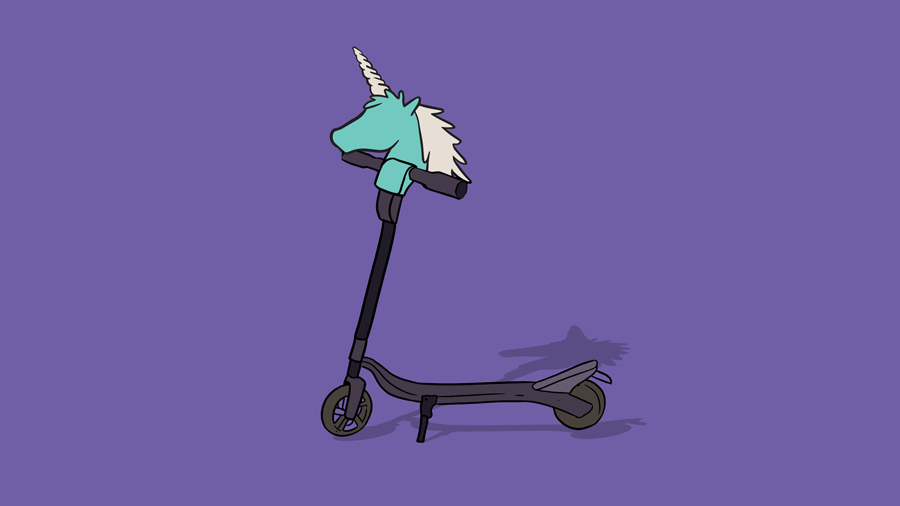Singapore’s Beam, which offers scooter rentals, and Pakistan’s Bykea, which offers bike ride-hailing, don’t have nearly the same resources as Uber, a company worth $55.4 billion dollars. But money isn’t the only competitive advantage, especially if you’re from out of town.
In fact, there’s enough room in global markets for competitors to thrive, and even break even—a feat Uber is far from accomplishing. Startups in these “frontier markets” aren’t worried about the ride-hailing firm as a competitor, such as Bykea.
Subscribe to the Crunchbase Daily
“The growth is costing [Uber] too much money, so I think they’ll restrict themselves to certain geographies,” said Muneeb Maayr, the founder of Bykea. “It takes coming to Karachi to realize why the most powerful company in the world has less than 10 percent of market share” in the bike category. Uber, which appears to operate in Pakistan, did not immediately reply for comment.
Maayr says Uber’s failure in the motorbike industry, specifically within Pakistan, is that “they were addressing a market which was not very savvy in English.” (Such an oversight is a problem that has been documented by Crunchbase News in the past.) And unlike Uber, Maayr’s startup claims it breaks even. That financial security in an industry known for steep losses encouraged investors to put $5.7 million into the company’s Series A.
Maayr said that his real competitor is Uber-owned Careem. Also, while not in the same region, Go-Jek falls into a similar bucket as it focuses heavily on motor-bike sharing, and he thinks logistics will make up a large part of Bykea’s business in the future.
The CEO of Singapore’s Beam, Alan Jiang, who I met for coffee and Chia seed lemonade hours before he hopped on his flight back to Singapore, has also found success in prioritizing the nuances of local markets. For context, Uber left Southeast Asia in March 2018 and sold its business to Grab. Uber has a 27.5 percent stake in Grab as a result of the sale.
“It’s the problem that US companies face when they try to set up businesses in such a fragmented place,” Jiang said, referring to Southeast Asia’s diversity from country to country.
Jiang calls Beam’s flexibility the “last man standing approach” amid the big competitors. Beam’s more modest footprint let’s it customize its product to the city it’s in.
For example, the scooter accessibility turns off during Typhoon season in Korea. And after Rundle Mall in Adelaide complained about Uber-owned Lime scooters, Beam listened to the city and didn’t offer scooters in that region. Limiting access, Jiang says, is in the company’s best interest.
This is especially true for Singapore, where the company is headquartered. Jiang, who worked at both Uber and ofo previously (both companies known for their rapid, sometimes reckless, growth), was told by Singapore officials that Beam can’t offer a scooter to the average consumer until around 2040 due to stringent laws around micro-mobility. And unlike Uber, which in its early days had a tendency to flout local laws in hopes that consumer demand would make it too big to shut down, Beam toed the government line.
“If they want us to wait for a license,” Jiang said, “we’re going to wait for a license.”
Meanwhile, Uber took a step out of Singapore with its scooter business, citing a reprioritization of efforts.
Yet Beam keeps it headquarters in Singapore. The location, despite the ban, gives Beam intimate access to local markets, engineering talent, and also a shot at Singapore’s business in 2040. Furthermore, neither founder seems incredibly intimidated by Uber. Both founders cited Uber’s fragmented distribution, reckless attitude, and inability to work with the local clientele and government as the reason it is sputtering abroad. It has given both companies market share, and confidence, that they can dominate.
Illustration Credit: Li-Anne Dias

Stay up to date with recent funding rounds, acquisitions, and more with the Crunchbase Daily.



![Illustration of a suitcase stuffed with money. Megafunds [Dom Guzman]](https://news.crunchbase.com/wp-content/uploads/Megafunds-470x352.jpg)
![Illustration of a guy watering plants with a blocked hose - Global [Dom Guzman]](https://news.crunchbase.com/wp-content/uploads/quarterly-global-3-300x168.jpg)
67.1K Followers